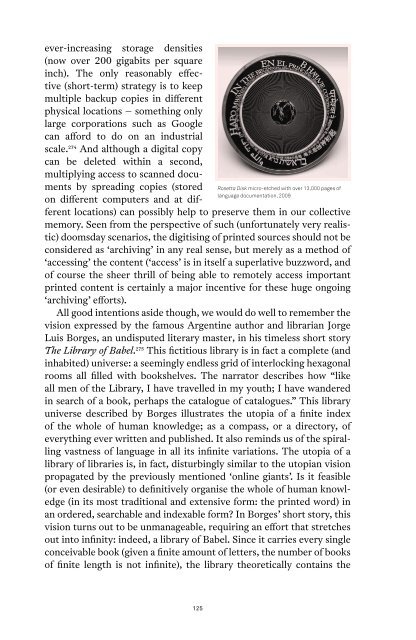Post- Digital Print - Monoskop
Post- Digital Print - Monoskop
Post- Digital Print - Monoskop
Create successful ePaper yourself
Turn your PDF publications into a flip-book with our unique Google optimized e-Paper software.
ever-increasing storage densities<br />
(now over 200 gigabits per square<br />
inch). The only reasonably effective<br />
(short-term) strategy is to keep<br />
multiple backup copies in different<br />
physical locations – something only<br />
large corporations such as Google<br />
can afford to do on an industrial<br />
scale. 274 And although a digital copy<br />
can be deleted within a second,<br />
multiplying access to scanned documents<br />
by spreading copies (stored<br />
on different computers and at dif-<br />
ferent locations) can possibly help to preserve them in our collective<br />
memory. Seen from the perspective of such (unfortunately very realistic)<br />
doomsday scenarios, the digitising of printed sources should not be<br />
considered as ‘archiving’ in any real sense, but merely as a method of<br />
‘accessing’ the content (‘access’ is in itself a superlative buzzword, and<br />
of course the sheer thrill of being able to remotely access important<br />
printed content is certainly a major incentive for these huge ongoing<br />
‘archiving’ efforts).<br />
All good intentions aside though, we would do well to remember the<br />
vision expressed by the famous Argentine author and librarian Jorge<br />
Luis Borges, an undisputed literary master, in his timeless short story<br />
The Library of Babel. 275 This fictitious library is in fact a complete (and<br />
inhabited) universe: a seemingly endless grid of interlocking hexagonal<br />
rooms all filled with bookshelves. The narrator describes how “like<br />
all men of the Library, I have travelled in my youth; I have wandered<br />
in search of a book, perhaps the catalogue of catalogues.” This library<br />
universe described by Borges illustrates the utopia of a finite index<br />
of the whole of human knowledge; as a compass, or a directory, of<br />
everything ever written and published. It also reminds us of the spiralling<br />
vastness of language in all its infinite variations. The utopia of a<br />
library of libraries is, in fact, disturbingly similar to the utopian vision<br />
propagated by the previously mentioned ‘online giants’. Is it feasible<br />
(or even desirable) to definitively organise the whole of human knowledge<br />
(in its most traditional and extensive form: the printed word) in<br />
an ordered, searchable and indexable form? In Borges’ short story, this<br />
vision turns out to be unmanageable, requiring an effort that stretches<br />
out into infinity: indeed, a library of Babel. Since it carries every single<br />
conceivable book (given a finite amount of letters, the number of books<br />
of finite length is not infinite), the library theoretically contains the<br />
125<br />
Rosetta Disk micro-etched with over 13,000 pages of<br />
language documentation, 2009

















